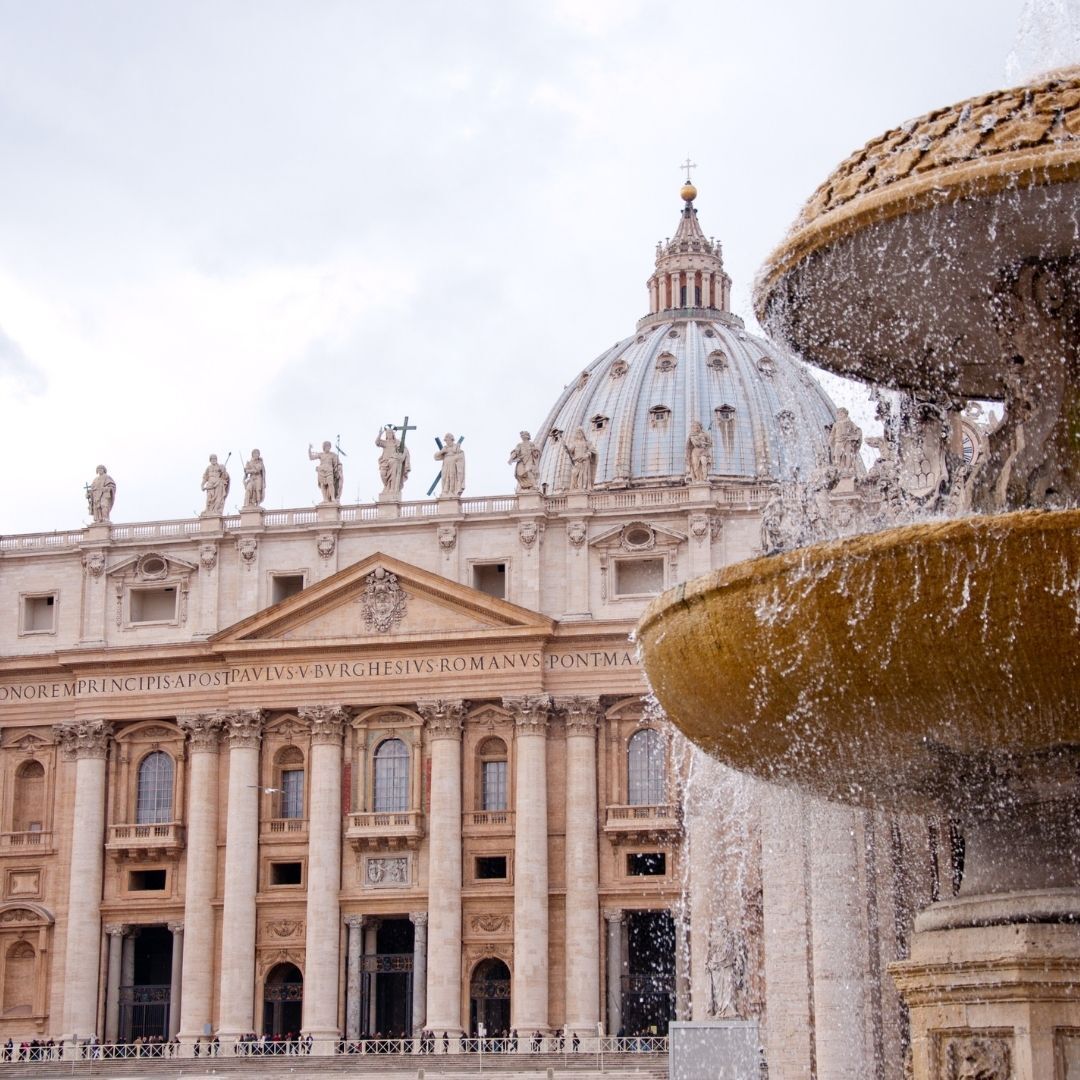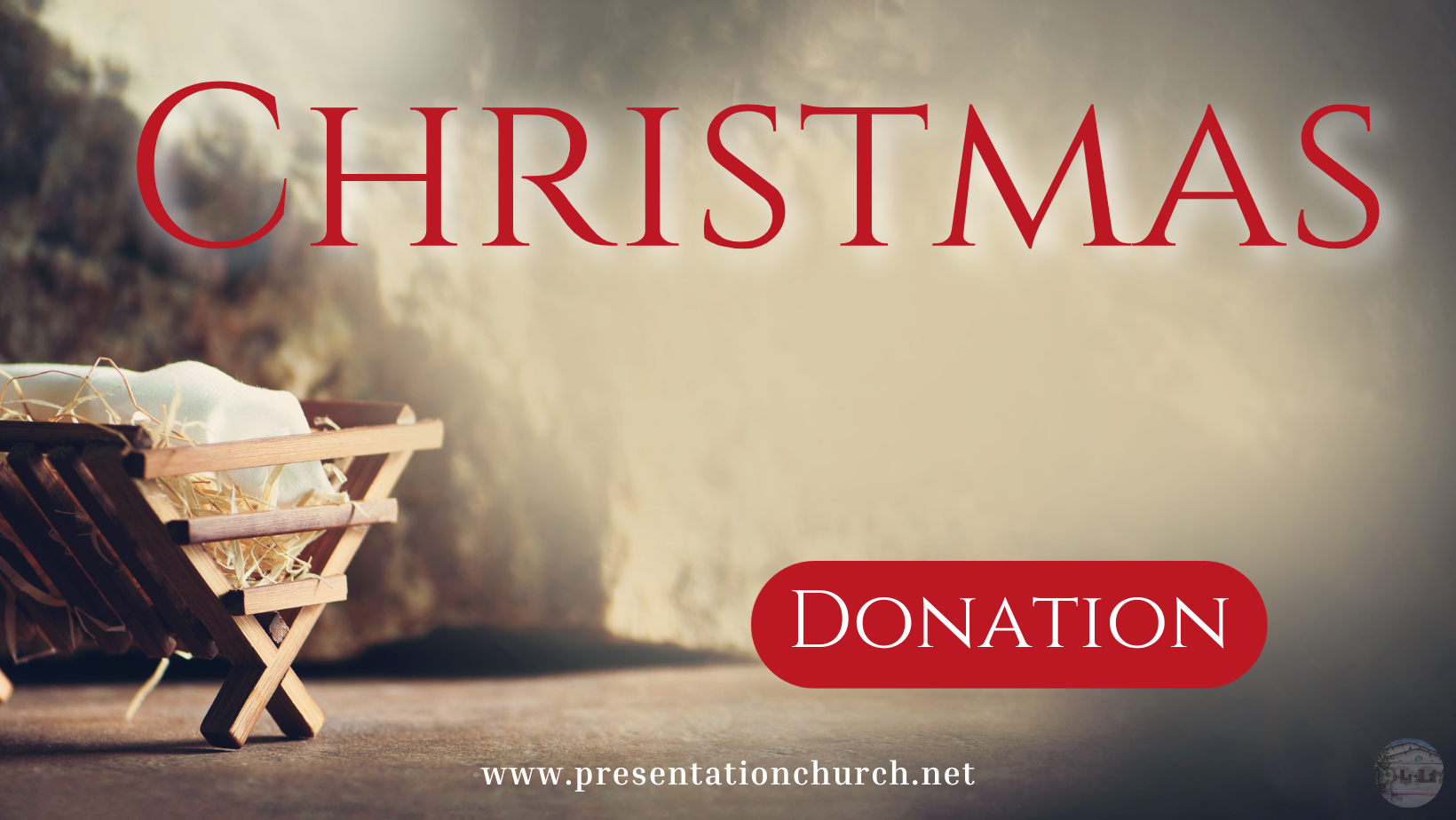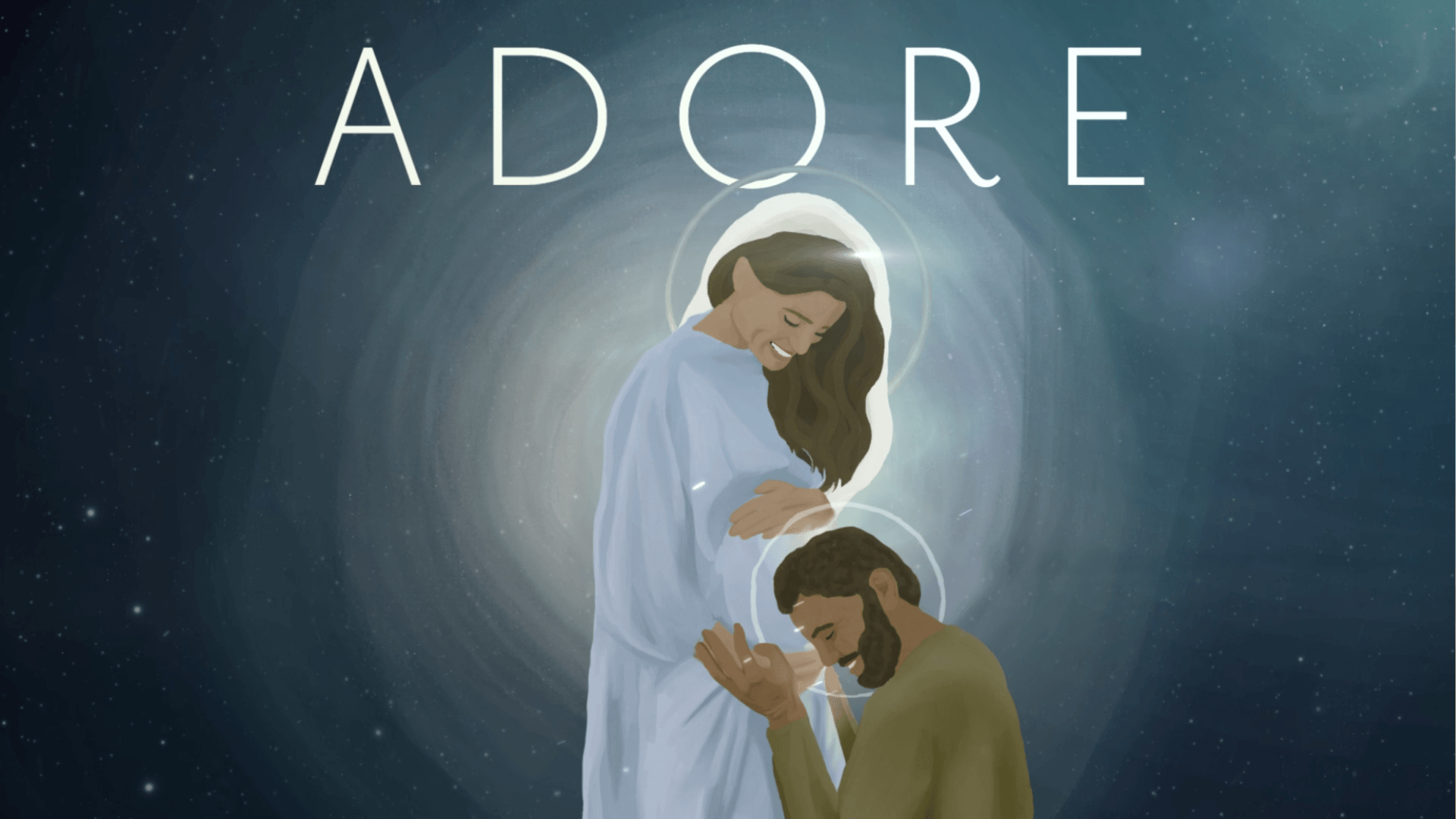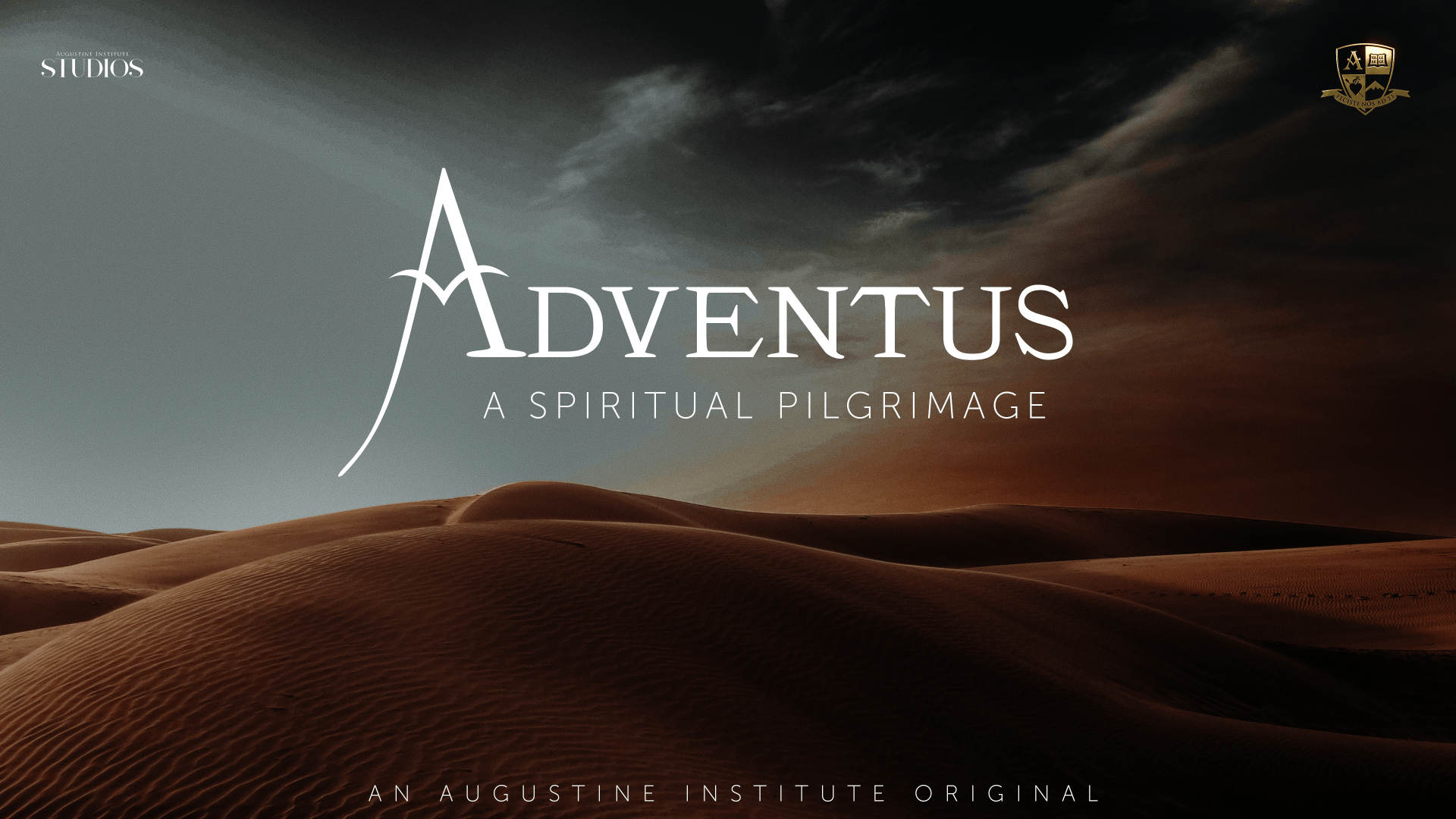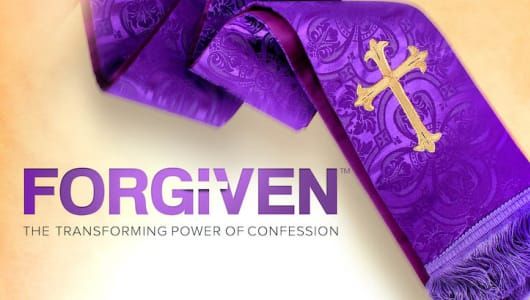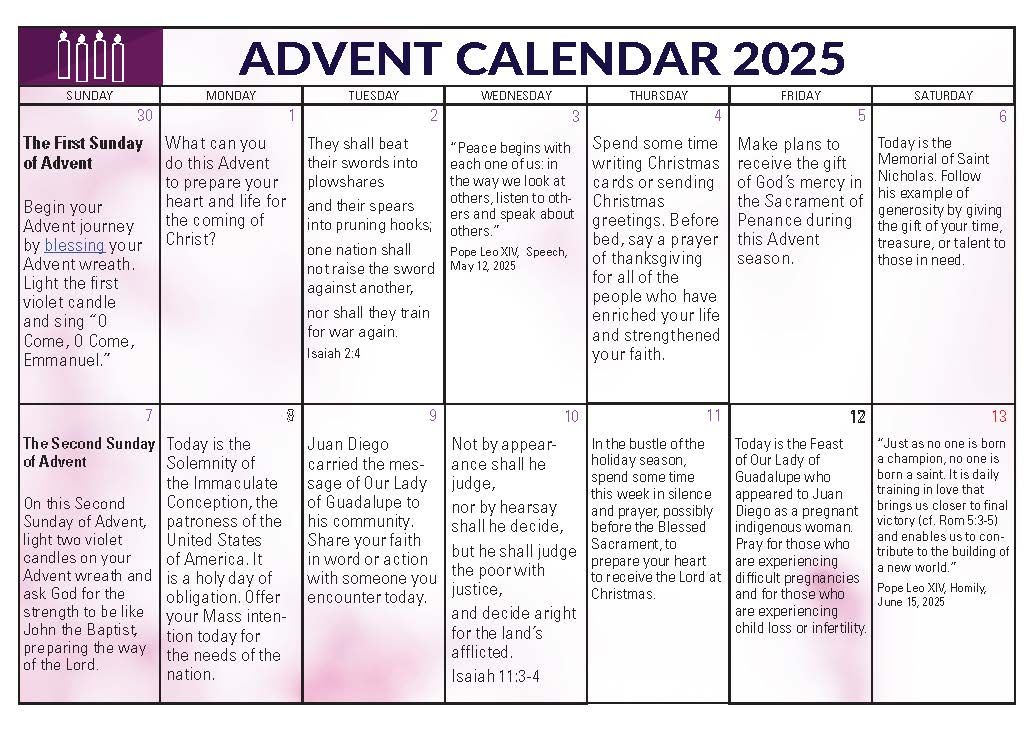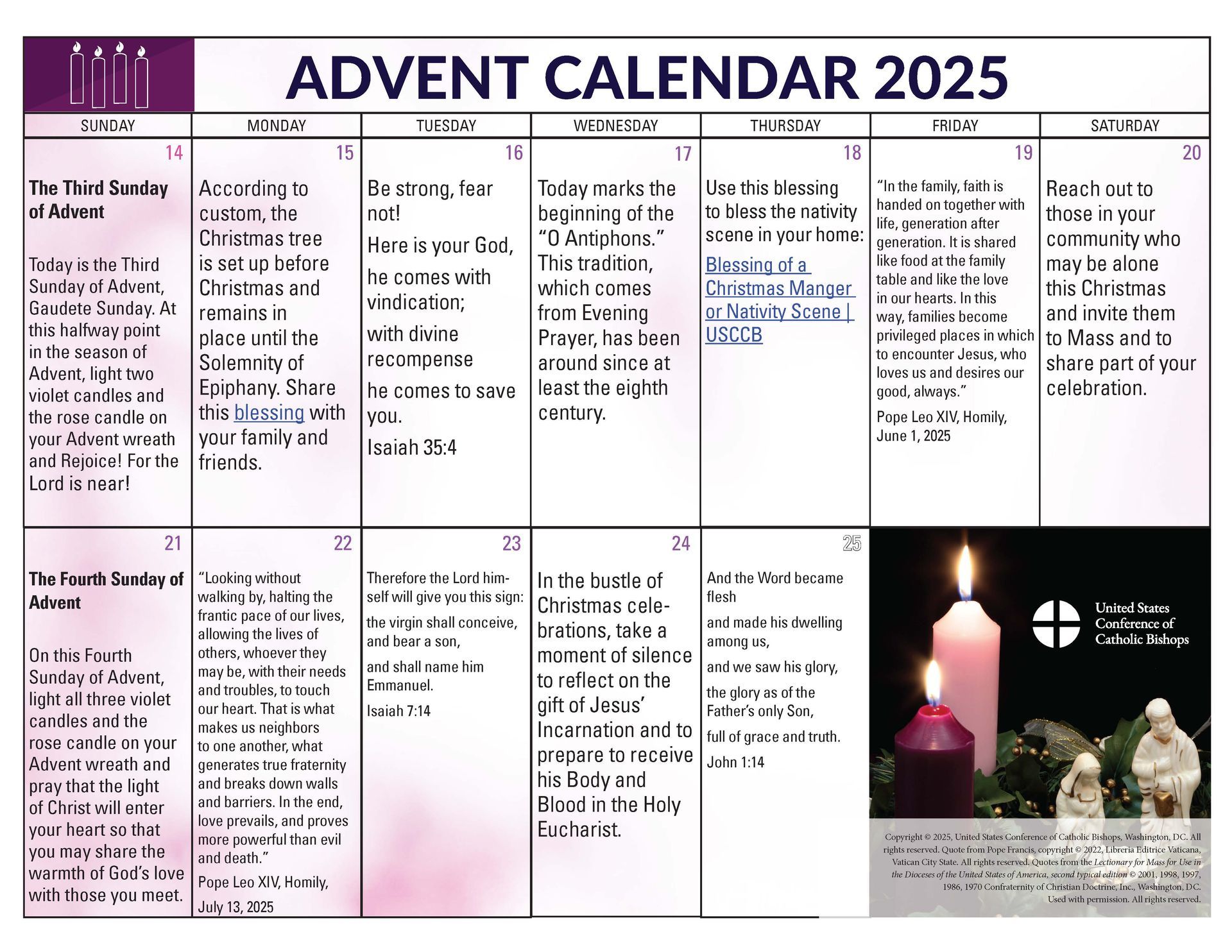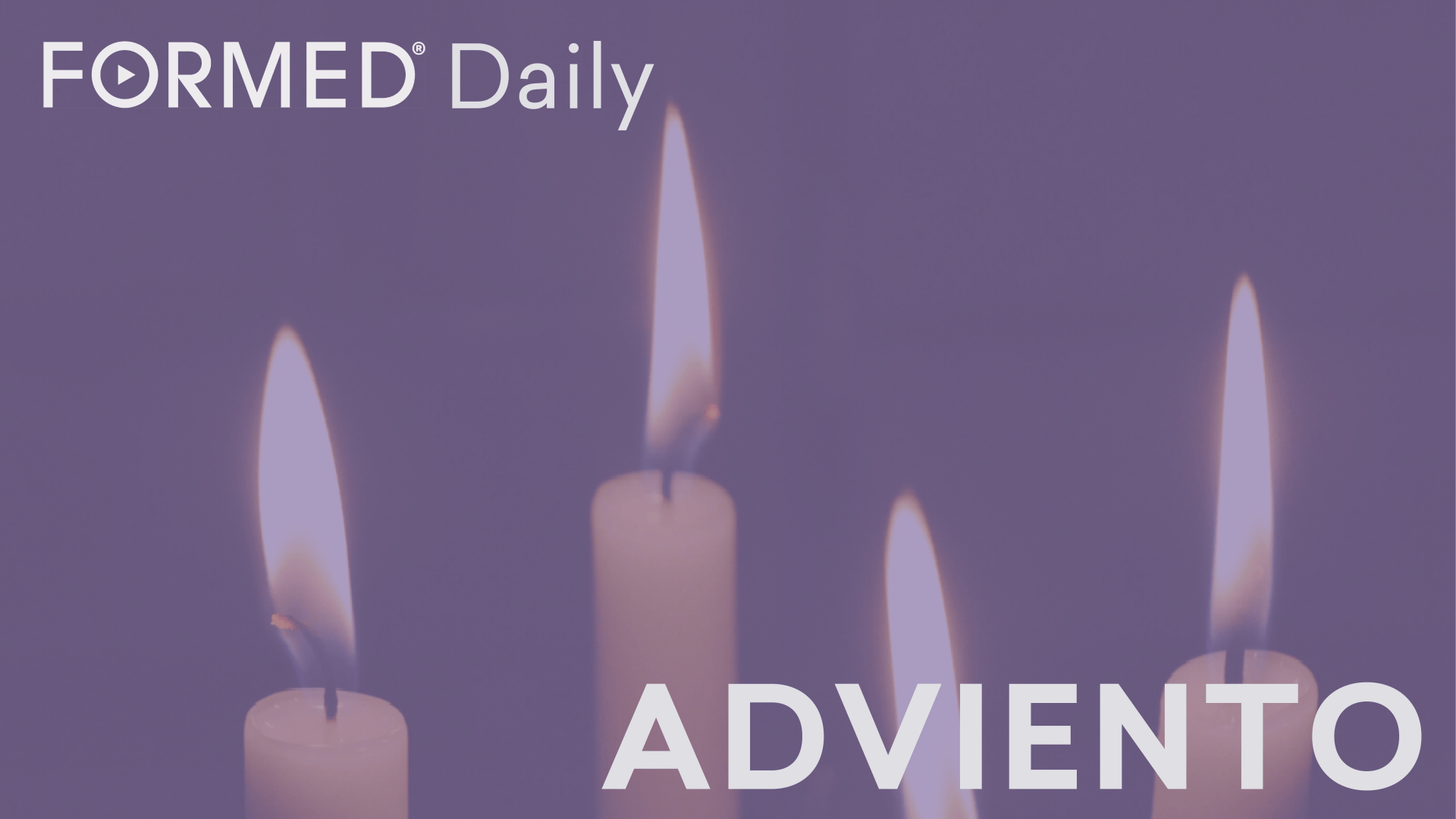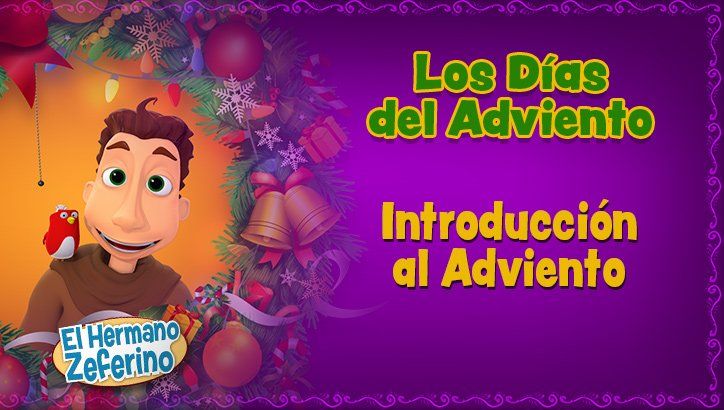Advent
Pope Leo's 2025 Advent Message
Dear brothers and sisters,
We celebrate this Mass on the eve of the day on which the Church commemorates Saint Andrew, Apostle and Patron of this land. At the same time, we begin Advent, the season for preparing ourselves to experience anew at Christmas the mystery of Jesus, the Son of God, “begotten, not made, consubstantial with the Father” (Nicene-Constantinopolitan Creed), as solemnly declared 1700 years ago by the Fathers gathered at the Council of Nicaea.
In this context, the first reading (cf. Is 2:1-5) of today’s Mass comes from one of the most beautiful passages in the book of the prophet Isaiah, where the invitation resounds, beckoning all peoples to ascend the mountain of the Lord (cf. v. 3), a place of light and peace. I would like, then, to meditate together on what it means to be part of the Church by reflecting on some of the images presented in this text.
The first image is that of the mountain “established as the highest of the mountains” (cf. Is 2:2). It reminds us that the fruits of God’s action in our lives are a gift not only for us, but for everyone. Zion is a city set on the mountain and symbol of a community reborn in fidelity. Its beauty is a beacon of light for men and women from every place, and serves as a reminder that the joy of goodness is contagious. The lives of many saints confirm this. Saint Peter meets Jesus thanks to the enthusiasm of his brother Andrew (cf. Jn 1:40-42), who was led to the Lord, along with the Apostle John, by John the Baptist’s zeal. Saint Augustine, centuries later, comes to Christ thanks to the ardent preaching of Saint Ambrose and there are many similar examples.
To read the full message from Pope Francis, click here (En).
MENSAJE DEL SANTO PADRE LEO PARA LA ADVIENTO 2025
Queridos hermanos y hermanas:
Celebramos esta Santa Misa en la víspera del día en que la Iglesia recuerda a san Andrés, apóstol y patrono de esta tierra. Y al mismo tiempo comenzamos el Adviento para prepararnos a rememorar, en Navidad, el misterio de Jesús, Hijo de Dios, «engendrado, no creado, de la misma naturaleza del Padre» (Credo Niceno-Constantinopolitano), como declararon solemnemente hace 1700 años los Padres reunidos en el Concilio de Nicea.
En este contexto, la liturgia nos propone, en la primera lectura (cf. Is 2,1-5), una de las páginas más bellas del libro del profeta Isaías, donde resuena la invitación dirigida a todos los pueblos a subir al monte del Señor (cf. v. 3), lugar de luz y de paz. Me gustaría, pues, que meditáramos sobre nuestro ser Iglesia, deteniéndonos en algunas imágenes contenidas en este texto.
La primera es la del “monte elevado sobre la cima de los montes” (cf. Is 2,2). Nos recuerda que los frutos de la acción de Dios en nuestra vida no son un don sólo para nosotros, sino para todos. La belleza de Sión, ciudad en la montaña, símbolo de una comunidad renacida en la fidelidad que es signo de luz para hombres y mujeres de cualquier origen, nos recuerda que la alegría del bien es contagiosa. Encontramos confirmación de ello en la vida de muchos santos. San Pedro conoce a Jesús gracias al entusiasmo de su hermano Andrés (cf. Jn 1,40-42), quien, a su vez, junto con el apóstol Juan, es llevado al Señor por el celo de Juan el Bautista. San Agustín, siglos más tarde, llega a Cristo gracias a la ardiente predicación de san Ambrosio, y así muchos otros.
Para leer el mensaje completo del Papa Francisco, haga clic aquí (Sp).
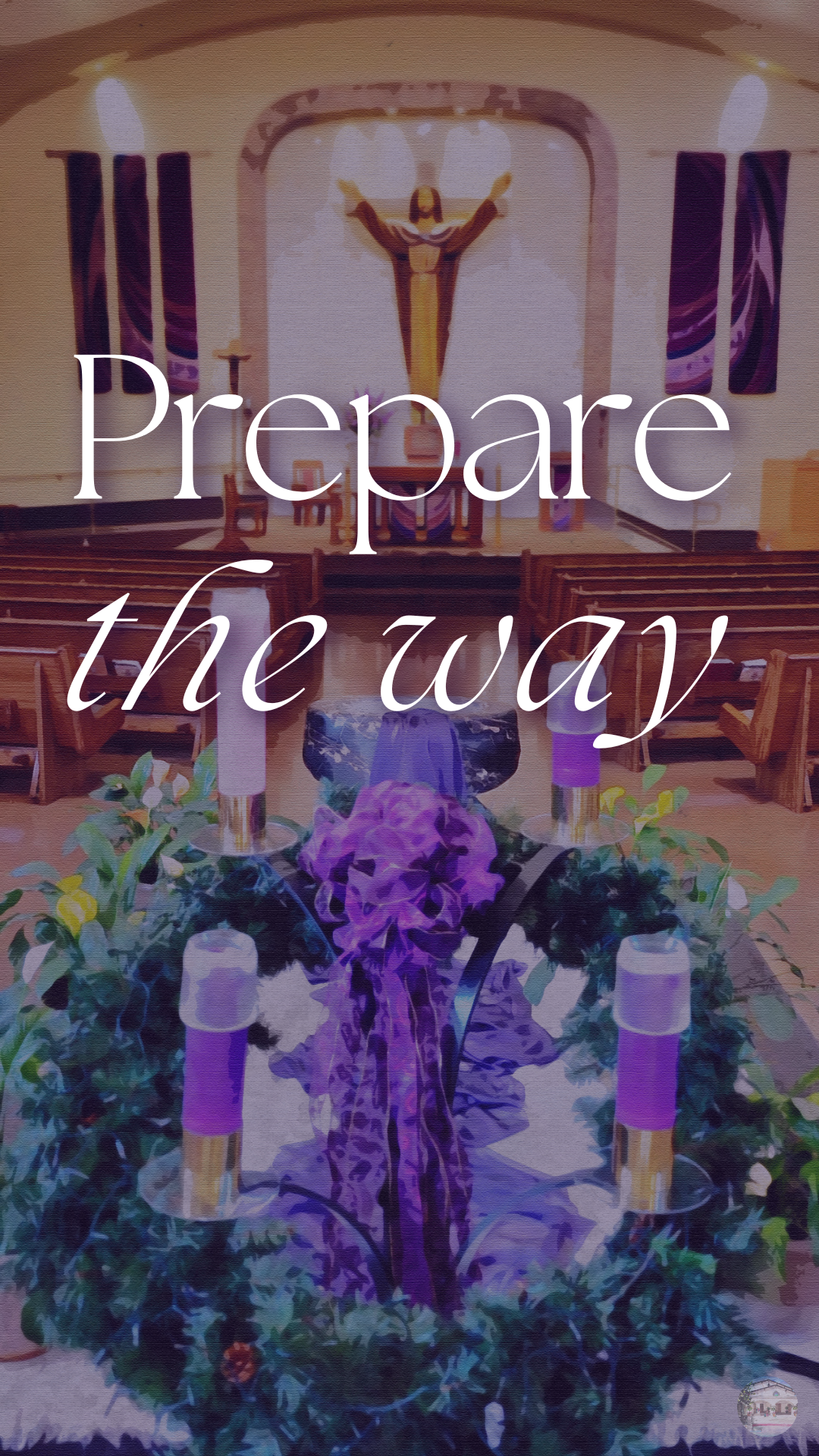
WHAT IS ADVENT?
The Advent season is a time of preparation that directs our hearts and minds to Christ’s second coming at the end of time and to the anniversary of Our Lord’s birth on Christmas. From the earliest days of the Church, people have been fascinated by Jesus’ promise to come back. But the scripture readings during Advent tell us not to waste our time with predictions. Advent is not about speculation. Our Advent readings call us to be alert and ready, not weighted down and distracted by the cares of this world (Lk 21:34-36). Like Lent, the liturgical color for Advent is purple since both are seasons that prepare us for great feast days. Advent also includes an element of penance in the sense of preparing, quieting, and disciplining our hearts for the full joy of Christmas.
Advent calls us not only to look back in grateful contemplation of Christ’s first coming, but it also calls us to look forward in preparation for His Second Coming. Advent is a time to reset and regroup, to repent over any misplaced priorities, to turn our minds and hearts back to God while we still have time. We do so not out of fear or guilt, but rather, out of gratitude for Love Incarnate lying in a manger bed.
Our lives are a gift. This holy season is a gift. Let us recommit to living the stewardship way of life. Love came down to us as a Baby. And He is coming again. Be watchful!
El Adviento nos llama no sólo a mirar hacia atrás en una contemplación agradecida de la primera venida de Cristo, sino que también nos llama a mirar hacia adelante en preparación para su segunda venida. El Adviento es un tiempo para reiniciar y reagruparnos, para arrepentirnos de cualquier prioridad equivocada, para volver nuestra mente y nuestro corazón a Dios mientras todavía tenemos tiempo. No lo hacemos por miedo o culpa, sino más bien por gratitud por el Amor Encarnado acostado en un pesebre.
Nuestras vidas son un regalo. Esta temporada santa es un regalo. Volvamos a comprometernos a vivir el estilo de vida de mayordomía. El amor nos llegó como un bebé. Y Él vendrá otra vez. ¡Esté atento!
ADVENT - RESOURCES IN ENGLISH
Bishop Cotta's Advent Reflection
Fr. Mark's Advent Reflections

Advent is a season of joyful anticipation as we prepare for the coming of Jesus at Christmas. On a deeper level, anticipation during Advent is about fostering a greater desire for the Lord and his presence in our daily lives.
- ADVENT FAMILY TRADITIONS: Use this guide to help you and your family anticipate and prepare for the coming of Jesus. Click here for resources.
- Small Group Reflection Guide: This weekly guide features Advent readings, reflections from Pope Leo XIV, and questions for sharing and listening. Click here for guide.
FORMED
Not yet on FORMED?
- Visit http://signup.formed.org/.
- Enter our parish’s zip code or name.
- Enter your name and email.
May God bless you during this special season!
DAILY REFLECTIONS
ROOTED
This new 22-episode series guides Catholics through a daily Advent reflection using the Jesse Tree model traditionally practiced by families. Each seven-minute episode introduces the ancestors of Jesus Christ, shares a Scripture passage, and offers an engaging, practical reflection.
Hosted by Dr. Scott Hefelfinger, Rooted helps viewers apply the passage and related teachings to each day of Advent, guided by the Church’s teaching.
ADORE - ADVENT REFLECTIONS WITH FR. JOHN BURNS
ADORE - ADVENT REFLECTIONS WITH FR. JOHN BURNS
The Advent season is filled with opportunity. Possibility of living a deeper life and living a fuller life. Join Fr. John Burns as he guides us to draw more deeply into the heart and life into the life that God has intiving us to through Advent.
Adventure and enter more profoundly into the season as we undertake the journey of the heart as we change and pilgrimage as a family of God.
ADVENTUS - A SPIRITUAL PILGRIMAGE
ADVENTUS - A SPIRITUAL PILGRIMAGE
On behalf of the Augustine Institute, we are offering Adventus: A Spiritual Pilgrimage to everyone this Advent and Christmas Season. In light of the separation we face as communities, this special documentary allows Catholics all around the world to unite and make a spiritual pilgrimage to the Holy Land to see the places associated with Christ’s Birth.
FORGIVEN - THE TRANSFORMATIVE POWER OF CONFESSION
FORGIVEN - THE TRANSFORMATIVE POWER OF CONFESSION
The season of Advent is a perfect time for spiritual renewal through encountering God’s mercy in the Sacrament of Reconciliation.
In this series, participants will discover the merciful way that God seeks us out when we have sinned and calls us back to himself. They will examine the sacrament from the perspective of both the priest and the penitent, and they will explore the scriptural foundation of the sacrament.
ADVIENTO - RECURSOS EN ESPAÑOL
Reflexión de Adviento del Obispo Cotta
Reflexión de Adviento del Padre Mark

El Adviento es un tiempo de gozosa espera mientras nos preparamos para la venida de Jesús en Navidad. En un sentido más profundo, la espera durante el Adviento nos invita a cultivar un mayor anhelo por el Señor y su presencia en nuestra vida diaria.
- TRADICIONES FAMILIARES DE ADVIENTO: Usa esta guía para que tú y tu familia se preparen para la venida de Jesús. Haz Clic Aquí para acceder a más recursos.
- GUÍA DE REFLEXIÓN PARA GRUPOS PEQUEÑOS: Esta guía semanal incluye lecturas de Adviento, reflexiones del Papa León XIV y preguntas para compartir y escuchar. Haga Clic Aquí para acceder a la guía.
FORMED
¡Disfruta de FORMED de manera fácil y gratuita!
- Ingresa a http://signup.formed.org/.
- Selecciona tu parroquia
- Inscríbete usando tu nombre y correo electrónico
- Revisa tu correo y sigue la liga para que comiences a usar FORMED
¡Que Dios los bendiga durante esta temporada especial!
REFLEXIONES DE ADVIENTO
REFLEXIONES DE ADVIENTO
¿Cómo te estás preparando para la Navidad?
Este Tiempo de Adviento, enriquece tu oración diaria caminando con el P. Luis Granados en un viaje de renovación, para preparar tu corazón a la venida de Cristo.
Cada día de Adviento, el P. Luis Granados te ayudará a encontrar el verdadero significado de esta temporada y sus ricas tradiciones, así como también ofrecerá consejos prácticos y valiosas lecciones para que este Adviento lo vivas de manera especial.
REFLEXIONES DIARIAS DE ADVIENTO EN ESPAÑOL PARA NIÑOS
REFLEXIONES DIARIAS DE ADVIENTO EN ESPAÑOL PARA NIÑOS
Los niños disfrutarán de los videos de Adviento del Hermano Zeferino todos los días durante el Adviento.
¡El hermano Zeferino nos guía en un viaje diario en esta especial celebración estacional de la venida del Señor! Con meditaciones, oraciones y actividades sugeridas para mantener nuestro enfoque en Cristo esta Navidad.

